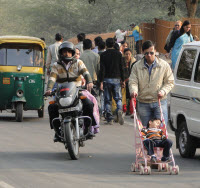
May 15, 2012 | News
iRAP has joined other leading organizations calling for road safety to be made a priority at the Rio+20 UN Conference on Sustainable Development in June 2012.
The publication of a statement by the organizations coincided with a Donor and Policy Forum in New York. At the event, a new report by Kevin Watkins of the Brookings Institute was published, making the case for inclusion of road safety and a ‘people first’ approach to transport policy in the Rio framework.
There was a significant breakthrough recently when a proposal by the Russian Federation to include road safety ‘as an integral part of sustainable development’ was agreed by the US, European Union, G77 and China during negotiations on draft documentation.
To support calls for road safety to be made a development priority, visit: http://www.makeroadssafe.org/takeaction/Pages/homepage.aspx.
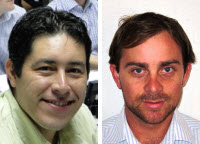
May 14, 2012 | News
Agustin Centeno and Morgan Fletcher have joined iRAP’s efforts to make roads safe in Latin America and the Caribbean.
Agustin (left) brings 10 years experience at the Mexican Institute of Transport to his role of Senior Road Safety Engineer. At IMT, Agustin was heavily involved in road safety audits and training. He also led much of the analysis work in the recent Pacific Corridor risk assessments.
Morgan (right) joins iRAP as Road Safety Engineer on a voluntary basis, and is one of a number of young engineers who have expressed interest in developing their experience in a foreign country and making a contribution to international road safety. Prior to joining the team, Morgan worked for almost five years with AECOM as a transport and traffic engineer in Australia.
Agustin and Morgan will each play a critical role assessing more than 45,000km of roads in Mexico, representing around 10% of the nation’s roads, and in projects through Latin America and the Caribbean.
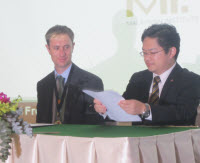
May 7, 2012 | News
The Mexican Institute of Transport (IMT), the Malaysian Institute of Road Safety Research (MIROS) and TRL in the United Kingdom have recently become iRAP Centres of Excellence.
The establishment of iRAP Centres of Excellence around the world is designed to help build technical knowledge for road assessment programmes and extend the reach of the programmes.
The Centres are peak organisations that have a demonstrated excellence in road safety engineering and are focused on activities for the public good.
ARRB Group in Australia was the first iRAP Centre of Excellence.

May 7, 2012 | News
Over the past decade, EuroRAP has grown from a four-country pilot to a major force for change in more than 20 countries.
EuroRAP will formally celebrate its 10th anniversary on May 22-24, 2012 at the annual General Assembly and Plenary sessions. The meetings are being hosted by Founder Members ADAC at their headquarters in Munich, Germany, where the first EuroRAP meetings took place.
The event will begin with a one day conference (speaking programme currently being finalised). For more information, contact Jo Marden at jo.marden@eurorap.org.
Apr 19, 2012 | News
Network-level Safer Roads Investment Plans provide a means of leveraging existing investments for road safety.
With financial assistance from the Global Road Safety Facility, the Philippines Department of Public Works and Highways (DPWH) and the Automobile Association of the Philippines (AAP) led iRAP assessments of approximately 3,000km of national roads. Although these represent just fewer than 10% of national roads, they carry almost 30% of traffic. The most comprehensive plan developed in the project identified investments totalling $150 million which could prevent an estimated 27,000 deaths and serious injuries over 20 years.
By identifying complementary objectives with projects as diverse as the Millennium Challenge Corporation (MCC)-financed improvements of roads in Samar, the Motor Vehicle User Charge ‘additional pavement width’ fund and the black spot program, opportunities to leverage existing finance to implement the majority of safety recommendations were identified. For example, although the ‘additional pavement width’ fund is specifically designed to increase road capacity, the iRAP project found that by improving overtaking facilities, and thereby reducing the risk of head-on crashes, significant safety benefits would also be achieved through the construction of additional lanes on parts of the network.
As a result of the success of the first project in the Philippines, a second phase of assessments was financed by the Australian Government overseas aid program, AusAID.
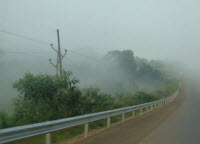
Apr 19, 2012 | News
Targeted safety improvements in Uganda will prevent thousands of deaths and serious injuries over the next decade.
iRAP Uganda is a collaboration with the Ministry of Works and Transport, the Uganda National Roads Authority and the Automobile Association of Uganda which has assessed some 2,400km of national roads. Many of the safety improvements identified in the project coincide with improvements put in place by the road authority with World Bank finance.
On the 136km-long Masaka-Mbarara Road, for example, improvements include paving shoulders, clearing roadside hazards, installing roadside safety barriers (see right), better delineation, provision of footpaths and traffic calming and construction of roundabouts. As a result of these improvements, the length of one-star roads for vehicle occupants has dropped by 47%. It is estimated that 144 deaths will be prevented each year as a result of the improvements.
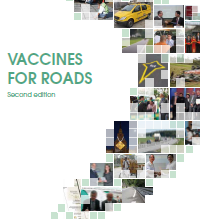
Apr 17, 2012 | News
In the second edition of Vaccines for Roads we argue that there has never been a more opportune moment to tackle this serious and rapidly worsening public health crisis by fundamentally changing the inherent safety of road systems around the world.
Vaccines for Roads describes how iRAP is now a global programme of local road safety champions leading RAP activities in more than 70 countries. Some half a million kilometres of roads have been assessed and numerous case studies show how road infrastructure safety is improving.
Apr 12, 2012 | News
ChinaRAP, a collaboration between iRAP and the Research Institute of Highway (RIOH), is developing rapidly.
The current phase of the project is being undertaken in partnership with Anhui Province, where some 700km of roads were recently surveyed. Many of these roads are slated for major upgrade with finance from the Asian Development Bank (ADB).
The Building ChinaRAP project is funded by the Bloomberg RS10 Project via the Global Road Safety Facility (GRSF) and is part of broader Road Safety Engagement Strategy being planned by the Government of China and the World Bank.
Apr 12, 2012 | News
A new project for South East Europe called South East Europe Neighbourhood Safe Routes (SENSOR) has been proposed by 14 countries – Albania, Boznia and Herzegovina, Bulgaria, Croatia, Greece, Hungary, Moldova, FYROM, Montenegro Romania, Serbia, Slovakia, Slovenia and Ukraine.
The SENSOR proposal builds on outstanding cooperation between authorities, automobile clubs and universities in the region in measuring and mapping the safety of roads. So far, with EU and development bank support, safety rating results have been developed by half the countries involved, mostly on trans-European E-routes.
Two countries, Serbia and Moldova, have already applied iRAP techniques and are implementing results in bank funded projects. The SENSOR project now proposes taking safety rating to the next level across the region. SENSOR proposes inspection of up to 20,000kms of priority routes including at least 50% of E-routes in participating countries. It proposes preparing “bank ready” investment plans that can save the most lives for the money available and strong public engagement. The SENSOR is the largest inspection programme outside Mexico
Huge support for SENSOR has been pledged by 16 organisations representing 14 SEE countries including charities and Universities, Ministries and Roads Agencies who can help implement recommendations. A response to the proposal to the EU submitted by Make Roads Safe Hellas on behalf of all the partners is expected in the first half of 2012.
Apr 12, 2012 | News
Improving safety for pedestrians – who account for about half of all people killed on roads in the Philippines – by building footpaths and safe crossing points is one of the priorities identified by the iRAP Philippines project.
The iRAP Philippines Steering Committee is now reviewing preliminary assessment results of more than 3,000km of national roads and options to implement safety countermeasures. Although these roads represent 12% of all national roads, they carry approximately 30% of traffic.
Based on the success of the GRSF-supported project, a second phase financed by AusAID is now underway. This includes assessment of an expanded road network, including roads that are targeted for upgrade with Asian Development Bank (ADB) finance, and assistance in the creation of Safe Road Demonstration Corridors on high-risk tourist and urban roads.
Apr 12, 2012 | News
Road safety programs in Europe are paying dividends with EuroRAP results showing reductions in risk.
In Spain for example, the RACC found that the number of high accident risk stretches or very high accident risk stretches has decreased from 36% (period 1999-2001) to 7.3% (period 2008-2010).
In Poland, researchers at the Technical Institute of Gdansk, together with experts from the motoring club PZM and the Foundation for Civil Engineering have shown that although 42% of total national roads were rated as high risk for the period 2008-2010, this is 19% (3,000km) less than in 2005-2007. Interactive maps are at http://eurorap.targeo.pl.
In the Czech Republic, UAMK and City Plan have published risk rate on national roads (i.e. motorways and class I roads) from 2003 to 2010. The number of lower-risk sections is increasing, while the share of the most risky ones is getting lower.
Full results are available at www.eurorap.org.
Apr 12, 2012 | News
iRAP and the AfDB, ADB, EBRD, EIB, CAF, CDB, GRSF, IDB, IsDB and MCC – who are among the world’s largest investors in roads – are working to accelerate road safety activities in developing countries, where 9 out of 10 of the world’s road deaths occur.
At a recent meeting the group pursued the establishment of consistent performance measures that will lead to investments in safer roads and major scaling-up of safety assessments by increasing the number of companies and organizations capable of surveying and rating roads and developing plans for engineering safety improvements.
As part of the meeting, iRAP Chairman, John Dawson, and Development Bank of Latin America (CAF) L. Enrique Garcia, Executive Chairman, signed an agreement that will see iRAP road assessments undertaken in the Banks’ shareholder countries.
Apr 12, 2012 | News
A two-day course was held in conjunction with the Africa Transportation Technology Transfer (T2) Conference in Arusha, Tanzania.
The T2 Conference served as a part forum, for sharing and exchanging existing and new approaches to technology transfer that enabled countries to develop integrated transportation systems.
The iRAP training course contributed to promote capacity building in road safety, with 25 participants in attendance. The course used iRAP training materials to educate and train road safety staff in the development, delivery and ongoing management of road assessments within a country.
The course demonstrated the technical and scientific approaches that can save approximately one in every three fatalities on the roads through the systematic application of proven road safety engineering improvements.
Apr 12, 2012 | News
Assessments of more than 20,000km of national highways around Australia have been published by AAusRAP. A total 1,170 road crash deaths, or 15% of all road deaths in Australia, occurred on the roads from 2005-2009.
The report includes a finding that on the top 15 most improved sections the number of casualty crashes dropped from 963 to 424 – a 56% drop – between 2000-04 and 2005-09.
The Minister for Roads in the State of Queensland, Craig Wallace, said that plans are in place to significantly upgrade the Bruce Highway, one of the roads identified as higher risk in the report.
The report is available at: www.ausrap.org. AusRAP is run by the AAA and it’s member automobile clubs, who are dedicated to saving lives by advocating for safer road infrastructure.
Apr 12, 2012 | News
Buckinghamshire County Council in Great Britain has received a Prince Michael Special Award for its comprehensive package of measures on the A4128 which cut fatal and serious crashes by 89%.
The measures, highlighted in the latest EuroRAP report, include: a speed limit reduction, improved directional and warning signs, improved road markings, intelligent road studs, traffic calming measures and upgraded pedestrian crossing facilities in villages.
Roads identified in the recent EuroRAP report have also featured in a 5-part BBC television series. ‘Britain’s Killer Roads’ visits some of Britain’s persistently high-risk roads, meeting road crash victims’ families and finding out what it is that makes these roads dangerous.
Apr 12, 2012 | News
Karnataka State Highway Improvement Project (KSHIP) engineers in India have used iRAP safety performance measures to dramatically enhance the design of some 550km of concession roads.
As a result of their efforts the length of road rated 1- or 2-stars will virtually be eliminated (dropping from 86% to 2%) for vehicle occupants and will decrease significantly (from 100% to 12%) for pedestrians. It is estimated that this will lead to a 54% reduction in deaths and serious injuries.
This work is part of efforts by iRAP to assist the multilateral development banks (MDBs) to improve safety performance measures in road design and address the Commission for Global Road Safety recommendation that desired design speeds for new roads be subject to achieving minimum safety ratings.The iRAP India Four States project is financed by the Bloomberg RS10 project via the Global Road Safety Facility.
Mar 30, 2012 | Report, Resources
Download Click the file icon above to download the file. 2012 iRAP Final report – Karnataka phase
Mar 29, 2012 | Report, Resources
Download Click the file icon above to download the file. 2012 iRAP Final report – Gujurat phase
Feb 1, 2012 | Report, Resources
Download Click the file icon above to download the file. 2012 iRAP report – Development of risk models for the Road Assessment Program

Feb 1, 2012 | iRAP Asia Pacific Workshop, Presentations, Resources
2012 iRAP Asia Pacific workshop – presentation archive Transcript of welcome by John Dawson Transcript of speech by Wu Lingtao, RIOH Safer Journeys: the New Zealand Road Safety Strategy The iRAP ARRB Centre of Excellence The ARRB Hawkeye platform – in action The...
Dec 1, 2011 | Report, Research, Resources
Download Click the file icon above to download the file. 2011 iRAP EuroRAP working paper – Before and after studies using crash data and iRAP protocols
Dec 1, 2011 | Report, Resources
Download Click the file icon above to download the file. 2011 iRAP report – Republic of Mari El Russian Federation (Russian): Safety assessment and recommended countermeasures
Dec 1, 2011 | Report, Resources
Download Click the file icon above to download the file. 2011 iRAP report – Republic of Mari El Russian Federation: Safety assessment and recommended countermeasures (English)
Dec 1, 2011 | Report, Resources
Download Click the file icon above to download the file. 2011 iRAP Technical report – Indonesia Demonstration Project
Dec 1, 2011 | Report, Resources
Download Click the file icon above to download the file. 2011 iRAP Technical report – India Four States Project






















